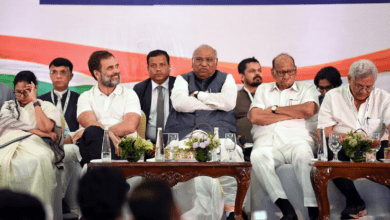What is said about China’s assault against India in the Congress Manifesto?
Foreign policy and national security are two areas where the Modi administration usually asserts its superiority over the Congress-led UPA government, which governed for two years till 2014. It is thus interesting to see how the Congress Party intends to enhance the performance of the Modi administration.

In terms of foreign policy and national security, we examined the key aspects of Congress’ manifesto and created the following list of points:
The discussion on China is perhaps the most noteworthy aspect. Here, the Congress has adopted a relatively assertive posture to differentiate its vision from the government as it now exists.
“The biggest blows to Indian national security in decades were the Chinese incursions into Ladakh and the 2020 conflict in Galwan. On June 19, 2020, Prime Minister Narendra Modi handed China a blank check, severely undermining our bargaining position.
“Chinese soldiers are still occupying Indian land and preventing Indian forces from accessing 26 of the 65 patrolling locations, which together cover an area of 2,000 square kilometers in eastern Ladakh, after 21 rounds of military-level discussions. As an introduction to the Defence portion of its platform, it states that “a Chinese buildup in Doklam threatens the Siliguri Corridor that connects northeast India with the rest of the country.”
“We’ll endeavor to put our borders with China back to normal and make sure that our forces can once again access the regions that both militaries have previously patrolled. Until this is accomplished, we will make the necessary adjustments to our strategy toward China,” it said.
The manifesto highlights that conventional war is just one type of aggression and that there are now many other ways that war may occur. It also pledges to build policies to handle hybrid warfare, data security, cyber security, financial security, communication security, and the security of trade routes.
Congress pledges to provide enough funding to satisfy the needs of India’s armed forces, citing the drop in military expenditure as a percentage of the national budget.
It promises to abandon the contentious “Agnipath” temporary military recruiting program introduced by the BJP administration and go back to the regular, ongoing recruitment process that offers troops social and financial security. The party also pledges to gradually increase the number of options for women to enlist in the military and serve in both combat and non-combat capacities.
In order to promote openness and military consensus, the manifesto also pledges to institutionalize the selection process for the Chief of Defense Staff, a critical role in joint operations and military reform.
Congress claims it would introduce a new Operational Directive for the military in order to handle the “two-front challenge” that China and Pakistan are now posing to India. This will take the place of the last order of that kind, which was issued in 2009 by the UPA administration headed by Congress.
A select parliamentary committee is proposed by Congress to oversee the National Security Council and the National Security Advisor’s office.
The National Economic Security Board, to be housed under the NSC, is a key proposal. Its objectives include tracking global financial flows to identify threats, strengthening India’s global economic footprint, addressing cybersecurity and digital issues, and monitoring risks to global supply chains. Congress wants to increase India’s local production of military and security equipment at a quick pace.
The manifesto pledges to execute One Rank, One Pension for veterans of the armed forces in accordance with the UPA’s directive from February 2014 and to address any irregularities that may have occurred in its execution under the BJP administration. It also pledges to bring back veterans’ tax-free disability benefits.
Regarding internal security, the Congress platform promises tough measures against those who propagate hate speech, commit hate crimes, and incite communal violence. It promises to put an end to “extra-judicial illegal measures” like as mob lynchings, police encounter murders, and “bulldozer justice” and to punish those who carry them out.
Within a year, the party hopes to operationalize the National Intelligence Grid (NATGRID) and National Counter-Terrorism Center, completing the internal security reforms it started after the 2008 Mumbai terror attacks. Congress will collaborate with states to establish, train, and equip state police forces to uphold law and order without fear or favor, recognizing that these forces are the first to react to threats to domestic security.
Stricter enforcement of the law and harsh punishment of offenders will be applied to drug trafficking, particularly the smuggling of narcotics via ports. The Central Armed Police troops will be expanded and modernized, with a target of having 33% of the troops be composed of women, according to the manifesto. The CAPF will fill open positions in order to reach its authorized strength.
ASIATIC POLICY
The Congress manifesto reaffirms India’s foreign policy continuity, emphasizing expanded bilateral involvement, strategic autonomy, and peaceful coexistence. Expressing regret for the BJP government’s deterioration of the long-existing foreign policy consensus, the Congress promises to rebuild India’s image internationally as “a voice of peace and moderation.”
The BJP/NDA government’s foreign policy has deviated significantly from this consensus in a number of areas, most notably on the current Gaza war. It said, “Congress promises to restore India’s standing as a global leader in peace and moderation in international affairs.”
Congress has pledged to support changes that would enable international institutions to handle transnational difficulties, work with developing nations on critical issues, and bolster India’s involvement in international organizations—all of which are important components of multilateralism. The party pledges to finalize outstanding trade agreements with consideration for Indian producers and consumers, seeing increased international commerce as a crucial component of its foreign policy.
Congress pledges to collaborate with other nations in order to eradicate terrorist organizations and cross-border terrorism, expressing strong opposition to terrorism on a global scale. Additionally, it seeks to make up for the harm done to India’s reputation abroad by the BJP government’s “intolerance of dissent and suppression of human rights.”
The manifesto highlights that calm attention to borders and firm defense preparation, rather than grandiose assertions, promote national security, a subliminal jab at the BJP’s “chest-thumping”. Congress pledges to work toward bringing China’s borders back to their pre-conflict state and making sure Indian troops may once again enter the regions they used to police. In the meanwhile, Congress will “take the necessary steps to adjust our policy towards China.”
India’s near neighbors will get more attention, according to the manifesto. This entails putting India’s unique relationships with Nepal and Bhutan back in the forefront, fortifying Bangladeshi economic and cultural ties, assisting Sri Lanka in mending political and commercial ties and resolving issues with the Tamil community, mending relations with the Maldives, and aiding the people of Myanmar in defending their human and political rights.
But the manifesto makes clear that cooperation with Pakistan is contingent upon Islamabad’s desire and capacity to put a stop to cross-border terrorism against India.
Congress wants to use India’s economic might to gain a leadership position in line with the nation’s ideals and mutually advantageous alliances, as well as to greatly expand the size of the Indian Foreign Service and establish additional posts overseas. In order to address the issues of Indians living abroad, it also intends to resurrect the post of Minister of State in the External Affairs Ministry.







